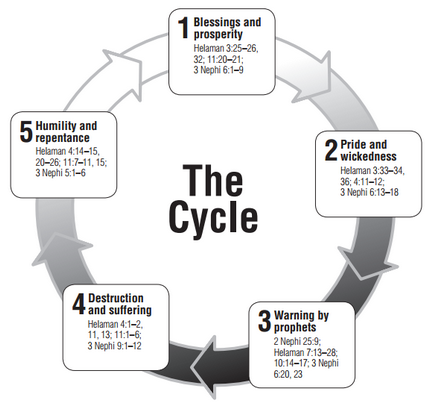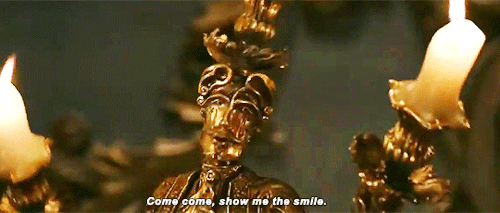Mormon friends: do you ever get tired of reading in the Book of Mormon about the Nephites and the Jaredites going through the infamous pride cycle over and over again? I mean, do you just sit down to read Helaman or Third Nephi and go uuugggggghhhh?
 |
| Tenor |
And do I need to remind any of you here of the number of times that this happened with the Israelites in the Old Testament? Just as soon as Moses had them going straight, something would happen and they would start murmuring. AGAIN. And their life in the Promised Land was no bed of roses, because they would repeatedly forget the Lord, break the commandments, worship idols, and then end up in bondage to their enemies.
 |
| Wheatley Scholars |
In our day, the pride cycle can happen in our personal lives, but in society at large it doesn’t seem so much a pride cycle as a long downward slope. And just when you think the world has hit the bottom, things keep getting worse. We turn to the scriptures, and we see the exact same thing: war, wickedness, sin, and destruction. If the Gospel is in the scriptures, then where is the part with the “good news”? The scriptures were written for our day, to help us get through. But seeing more examples of what we’re already seeing doesn’t seem to give much comfort, much less answers.
It doesn’t take a lot of imagination to figure out that those ancient peoples are US. And it probably doesn’t take much more thinking than that to realize that the wicked people who are ripening for destruction are not meant to be our role models.
 |
| lds.org |
So what do we look for? We read about the people who stayed righteous in the midst of all that wickedness and all of their personal trials. We read about Abraham, Joseph the son of Jacob,and Moses; Joshua, Gideon, Ruth, Deborah and Barak, Samuel, Elijah, Hezekiah and Isaiah. We read about Lehi and Nephi and Alma and Alma the Younger and Nephi son of Helaman; we read about Mormon and Moroni and Ether. We read about Jesus Christ. We read about the people who followed Him, His mother Mary, Peter and John and the apostles, Stephen and Paul. What are they writing about their experiences and the lives of those who came before them? What are they learning that they want to share with us? How do they stay righteous in a wicked, difficult world?
 |
| This goes for the Book of Mormon, too! (Pinterest) |
In His final sermon to His apostles, Jesus shared the secret: “In the world ye have shall have tribulation. But be of good cheer: I have overcome the world” (John 16:33).
 |
Jesus overcame the world. He rose above the sin, the sorrow, the despair, the grief, the lust. He rose above everything evil in this life. He descended below all things, and was thus able to overcome all things.
He did not get caught in the Pride cycle: HE BROKE THE CYCLE.
He is Risen, not just above death but above sin and above pain and suffering. Above repeated human errors and mistakes.
 |
HE. BROKE. THE. CYCLE.
AND BECAUSE HE DID, SO CAN WE.
In the Intercessory prayer (John 17) He asked the Father not to take his disciples from the world but to keep them from the evil. We are still supposed to be a part of this mortal experience. We came to experience the pros and the cons. But the cons don’t have to make us weaker. Christ can help us overcome the things that are difficult. Christ made it possible for us to be stronger than our pains, our temptations, our sufferings through His Atonement.
He is the Light of the world. He is stronger than the darkness.
All those people in the scriptures who still managed to make it through even though they were surrounded by wickedness and evil and destruction? They made it because they chose Christ.
In one of his last letters to his son Moroni, Mormon wrote a harrowing description of the atrocities committed by both the Nephites and the Lamanites. And then he said something to Moroni that I think we should all listen to: “My son, be faithful in Christ; and may not the things which I have written grieve thee, to weigh thee down unto death; but may Christ lift thee up, and may his sufferings and death, and the showing his body unto our fathers, and his mercy and long-suffering, and the hope of his glory and of eternal life, rest in your mind forever” (Moroni 9:25, emphasis added). Believing in Christ doesn’t necessarily make everything around you perfect or solve all your problems. BUT believing in Christ can help you to be all right when everything else is chaos.
 |
As he is abridging the record of the Jaredites, Moroni takes a chapter to write out some of his feelings on the subject and some of his experiences in coming to know the Savior. He says that he had prayed that God would “give unto the Gentiles grace, that they might have charity.” But God’s response was,” If they have not charity it mattereth not unto thee, thou hast been faithful; wherefore, thy garments shall be made clean. And because thou hast seen thy weakness thou shalt be made strong, even unto the sitting down in the place which I have prepared in the mansions of my Father” (Ether 12: 36-37). We don’t have any control over what other people choose. But if we are faithful, then our own salvation is assured. Peace in this life. Eternal Life in the world to come. We will be able to overcome the world and have that reward.
 |
In Paul’s second epistle to Timothy, we read Paul’s counsel to those who were trying to stay true to the faith in a time of difficulty. The Great Apostasy--the time when the true Church would be corrupted and the truth of the Gospel lost--was at the doors. “For the time will come when they will not endure sound doctrine; but after their own lusts shall they heap to themselves teachers, having itching ears; And they shall turn away their ears from the truth, and shall be turned unto fables” (2 Timothy 4: 3-4). Paul would soon be going to his own martyrdom (vs. 6-8). But Paul’s counsel was simply to be ready for whatever came, and to stay true to the faith. In the previous chapter, he had reminded Timothy to “continue thou in the things which thou hast learned and hast been assured of.” The message for us today is the same: stay true to what you know, do the things you know are right. Doubt and fear can and will be overcome.
 |
In the book of Revelation, we read of God’s promises to those who “overcome” the sins and temptations that were plaguing the seven churches: they would be clothed in white, named in the book of life, have part in the first Resurrection, receive eternal life, and live in the presence of God (Revelation 2-3). And as recently as the last general conference, Elder Neal A. Andersen gave a talk on the attributes of those who overcome the world as Christ overcame it. Overcoming the world, Elder Andersen said, is not done in a single moment but over a lifetime. But it can be done. Christ overcame, and he will help us to overcome.
































